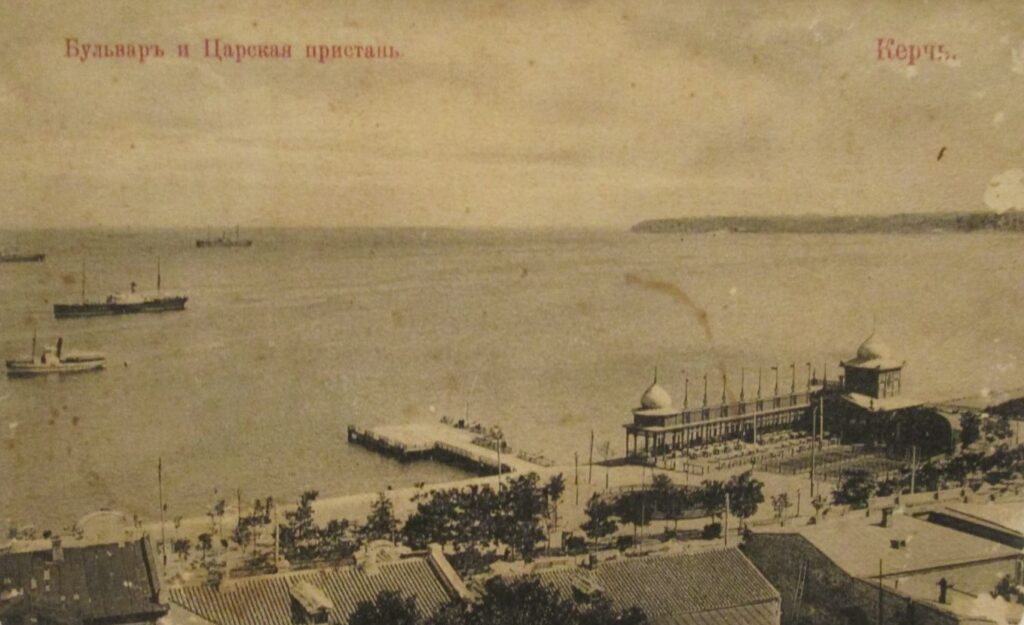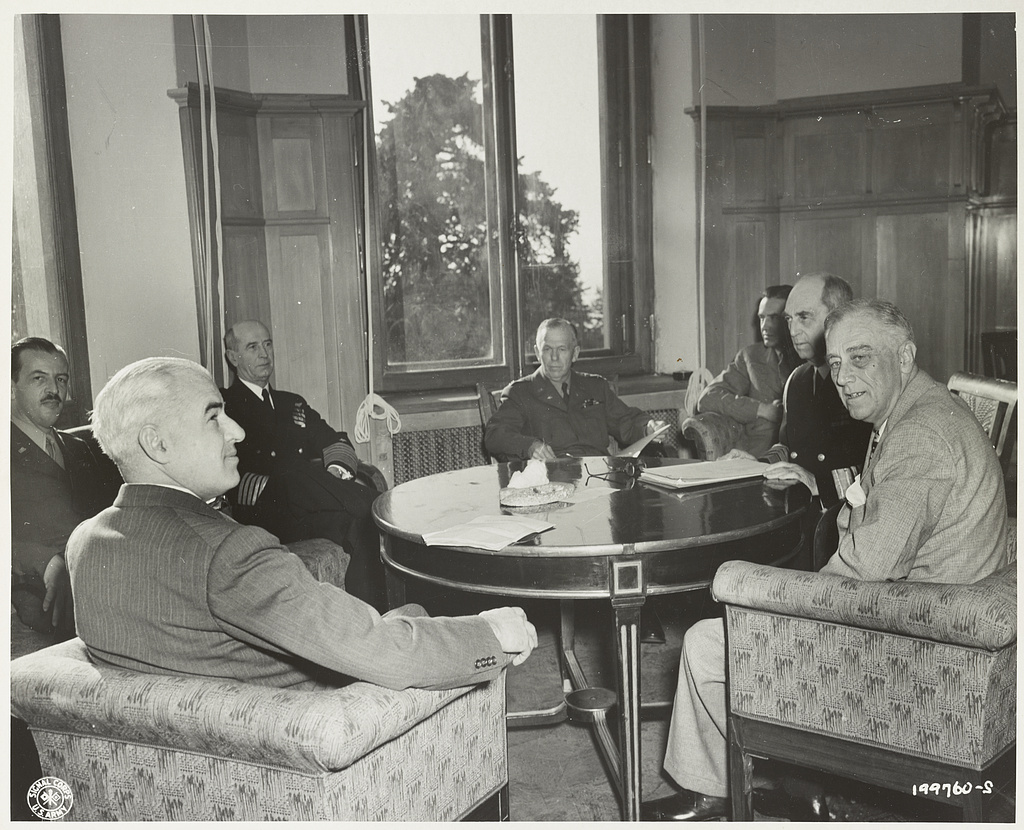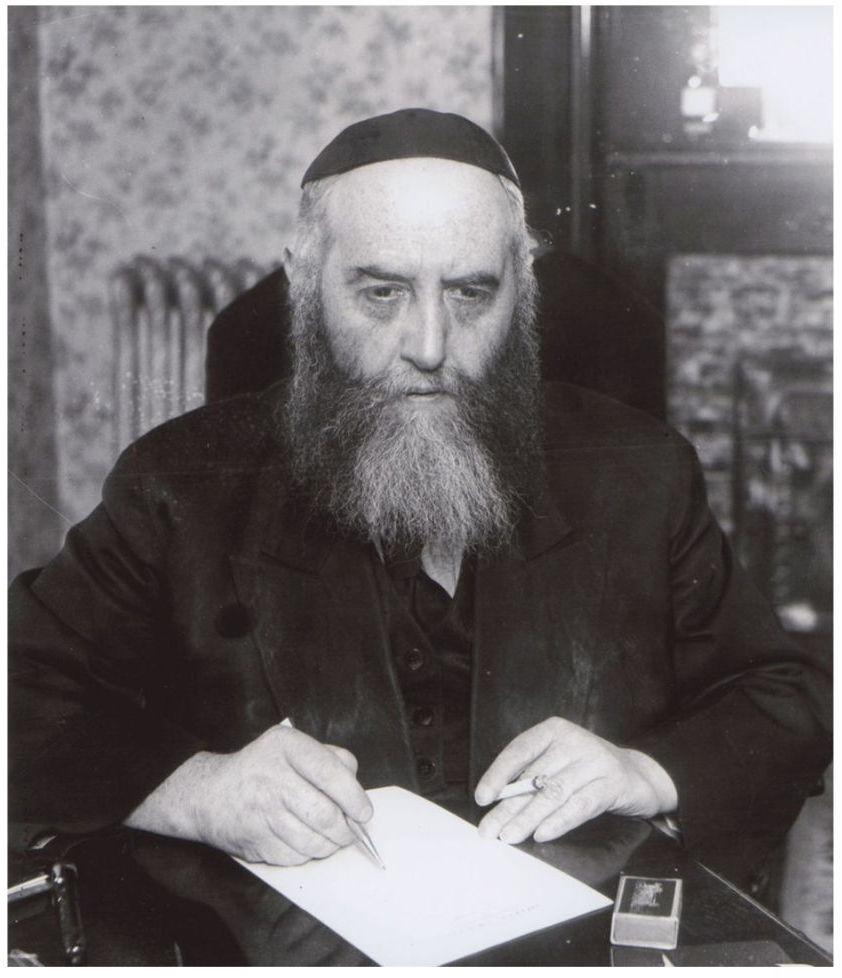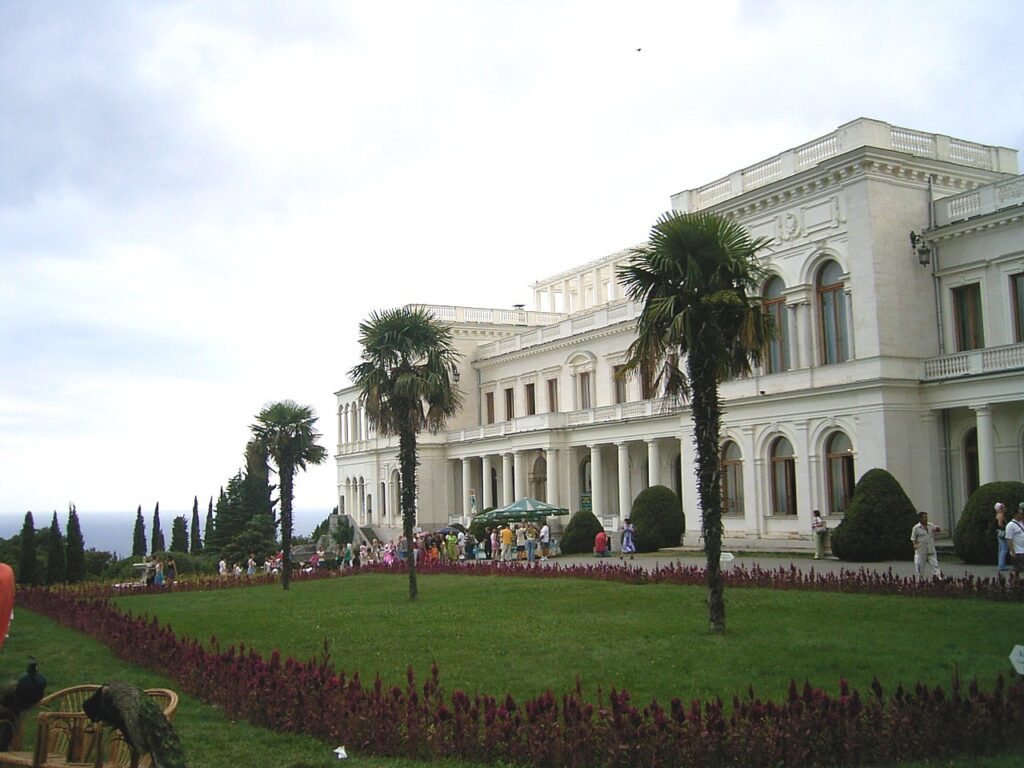Yalta – 80 Years Since the Conference, and Memories of Days Past
Eighty Years Since the Yalta Conference
Eighty years ago today, the Yalta Conference concluded, which brought together the heads of the world powers to discuss the fate of Europe in the face of the looming defeat of the Nazis.
Beautiful and historic Yalta is located on the Crimean peninsula, surrounded by forested mountains and brimming with healing springs that have always attracted many tourists.

The Crimean Peninsula in 1940
There was a Jewish community in Yalta, and with the Nazi occupation, the community members, about 1,500 in number, were liquidated in the ghetto that the Nazis established in the vicinity of Yalta.
The conference, which the Nazis, bleeding on the battlefields, refered to in their publications as the “Jewish Conference,” was held in former imperial palaces, and was attended by the heads of the world powers: US President Roosevelt, Russian leader Stalin, and British Prime Minister Churchill, and they discussed what the future borders of Europe would be after the war.
At that time, the Red Army was already fighting in the depths of Budapest and the US army was one step away from conquering Berlin. The conference of the heads of the world powers brought with it a message of world unity in order to eradicate the Nazi regime that had brought disaster to all of humanity, but unfortunately, three years after the conference, the Cold War broke out, which disturbed the peace of the world for a long time.
For many years, there was a sharp debate in the US and Europe about the outcome of the Yalta Conference. Some claimed that Roosevelt had succumbed to Stalin’s whims and brought disaster to Eastern Europe. On the other hand, there were those who claimed that this conference had prevented the bloodshed of countless people. As for the concessions? Both sides gave up.

The American delegation at the Yalta Conference
What is clear is that Stalin emerged as the main beneficiary of the conference, and even more clear is that for Eastern European Jewry, its results were very bad. The Iron Curtain that was then lowered over millions of Jews throughout the Soviet Union, which included large parts of Eastern Europe (across present-day Ukraine and Poland, and more), caused an unprecedented disaster for these Jews who lived unfavorably throughout the rule of communist Mother Russia, which did everything in its power to extinguish the light of Judaism throughout these vast lands, and sadly, it succeeded.
Ten years later, in 1955, the western world was shocked by various revelations that emerged from the Yalta Conference discussions. The leaked secrets sparked a fierce debate about whether the presidents of the European powers had surrendered to the communist dictator or whether there had been meaningful negotiations in which both sides gained and lost.
Either way, this conference gave birth to the United Nations, the inefficient organization that today constitutes a fertile breeding ground for Israel hatred and antisemitism, and whose decisions are almost automatically biased in favor of extremist Islamic countries, whose sole purpose and essence is death, terror, and backwardness.
Now, eighty years later, it is difficult to ignore the feeling of loss. The world could have joined hands then and united in the goal of eradicating hatred and extremism, permanently. Barely eighty years have passed since then, and the world is no longer frightened by voices and threats calling for the extermination of a people. Radical Islam, coming from countries of poverty and tyranny, is slowly taking over the cities of Europe and sowing destruction and hatred in them; countries with enormous military power do not hide their intentions against the people who live in Israel, the People who have survived and who are threatened from within and from abroad.
Eighty years have passed, and the Jewish People know that they cannot feel secure in great America nor in Europe. The events of October 7th proved that we have no one to lean on but our Father in Heaven.
Memories from the Scenes of Yalta
And when we discuss the Yalta Conference, we are reminded of the prison writings of the previous Lubavitcher Rebbe, Rabbi Yosef Yitzchak Schneerson, which is like a detailed diary of his experiences in the “seventh” prison, in 5687 (1927). The diary evokes strong emotions, and every part of it has wonderful content that is all about dedication to Judaism.

Rabbi Yosef Yitzchak of Lubavitch, Brooklyn 1944
At the beginning of his remarks, the Rebbe writes this passage:
Man, besides the fact that he has fixed periods in his life – the days of childhood, adolescence, studenthood, young adulthood, the days of growth, old age and retirement – and besides the state of his talents, whether ordinary and mediocre, or brilliant and wonderful, and also his nature, whether shy and sad or cheerful and joyful, besides all this, the Supreme Providence invites him to special periods which sometimes change man’s nature and develop his talents to place him on a special height, to look at the purpose of human life on earth.
The period that is most powerful in its effect on the course of a person’s soul and the development of his talents is the period that is richest in torture and agony, in favour of diligent and vigorous work for some knowledge, and in particular one that struggles and fights with his persecutors and oppressors for the sake of the existence and strengthening of his religion.
This period, while fraught with physical torture and mental anguish, is also rich in powerful impressions and is the time of light in a person’s life.
Every event and incident during this period is very important and honourable, and all the more so, a case of arrest and imprisonment, for the magnitude of the spiritual benefit that comes with it; it is appropriate to note not only the days and nights, but also the hours and moments, because every hour and moment of sorrow, penance, and torture brings immense benefit and unlimited mental strength, as even the weak become the strongest of heroes.
In his writings, when the Rebbe writes about a passionate prayer he merited to recite within the walls of the detention center, between one interrogation and another, he tells us that he then remembered the trip to Yalta with his parents, and about a special insight he heard from his father z”l. This memory is connected to the city of Yalta and its landscapes, let us read:
The wonderful picture that my father and teacher z”l showed me when I was a boy of five or the beginning of six years old flashes through my mind.
We were traveling then between the Crimean Mountains, between Sevastopol and Yalta in a carriage drawn by four horses, according to the custom of the place. The passengers: my father and teacher z”l and my esteemed mother and teacher z”l, may she live a long and pleasant life in spiritual and material goodness, and with the coachman sits the cook, my governess.
The journey was between high mountains, very high, a rocky place, and the road turned and went under the mountains. On the right – the mountain, and on the left – the seashore.
We passed through one station which was located in the mountain, and from there on was the journey between the mountains. At one place, we stopped to rest on the field, that is, between stations, where it was customary to let the animals pulling the carriages graze.
We sat on one of the rocks, my esteemed father and teacher went aside, under one of the tall rocks, or more precisely, entered a small valley between two tall rocks, and prayed the Mincha service, even though it was still noon.
My honoured mother and teacher, the Rebbetzin, prepared some food, because we still had to travel five or six hours in that carriage or in another one.
And I, although I would rather have been in the company of the driver, who was busy with the four horses that he had, a heavy stone weighed on my heart; my father told me that when we come to Yalta, a special man would come there, a teacher who would study with me. And I did not know anything about the man who was destined to come, and I did not yet know whether his manners and conduct would be like those of my teacher, Rabbi Yekutiel z”l.
Rabbi Yekutiel the teacher – an old man, approaching seventy years of age, but an expert, he was the one who descended into the innermost recesses of the lives of four-year-old babies.
And for five years, their hearts continued to love him and the lessons he imparted. A great worker was Rabbi Yekutiel the teacher. I do not know if he inherited this talent, the talent of teaching, or if he was gifted it by G-d directly, but in any case, he was a wonderful worker, an exceptional worker.
The examples and wise parables that Rabbi Yekutiel the teacher, explained and expounded upon to his students in the pictures of the letters, would attract the student’s heart to hear, fix them in his mind, and seal them in his memory:
A bucket from here and a bucket from there, and a stick of water in the middle is the letter alef, which has the letter yud on this side and a yud on on this side, and a line in the middle. And whenever we saw a water carrier, we would remember the letter alef. And so on with other images and matters in such a way, until every incident in our lives reminded us of some matter of study. When the Yalta trip was decided, my esteemed father began to study with me himself, and I was already studying the siddur (prayerbook) and knew the interpretation of a few segments.
During our trip we stayed in Kharkov for about two weeks, because the professors wanted to make some examinations regarding the state of health and the medical treatment of my esteemed father.
During all this time, he studied with me himself, and did not put me under the care of a teacher, and he promised me that when I behaved properly, he would study with me himself. On our trip to Kharkov, he told me that the professors had ordered him not to talk much, so he would get a teacher for me and from time to time he would study with me himself.
I had already understood that it is the son’s duty to take care of his father’s health, and I was very saddened by the decline of his health, but the desire for my father to study with me himself prevailed over everything, and I thought that with my good wishes, I would improve my father’s health.
My behaviour was so good that since we left Kharkov, there hadn’t been a single behaviour that I hadn’t thought of doing in a more beneficial way. And so at that moment, I took the siddur and sat down on one of the small rocks.
And I reviewed my lesson, with the hymn “the heavens recite the glory of G-d” (Psalms 19:2).
* * *
We sat down to dine on various foods, and my esteemed father and teacher, showed us a place high on the mountain, very high, and far away, that is, from where we sat, we saw what looked like a large hole in the rock that stood at the top of the mountain.
My estemed father told that in the year 5644 (1883-4), he was travelling with his esteemed brother, my uncle, Rabbi Zalman Aharon Schneerson. They travelled from the station we passed to here at night, and at six in the morning, they stopped to rest in this place, and went to pray the morning prayer at the top of the mountain. At first, before they arrived there, it seemed to them that it was just a hole, but when they arrived there, they saw that it was a long, hollow cave, with small rocks lying there, a good place to sit.
Then he explained to me that G-d created the world in such a way that every Jew can fulfill the commandments of G-d, and that if a person is traveling on a road and the time for prayer arrives, and it is forbidden to pray in the open field, for this reason G-d created hollow rocks like these, which are like houses, so that they can pray there.

Livadia Palace, one of the palaces where the Yalta Conference was held














